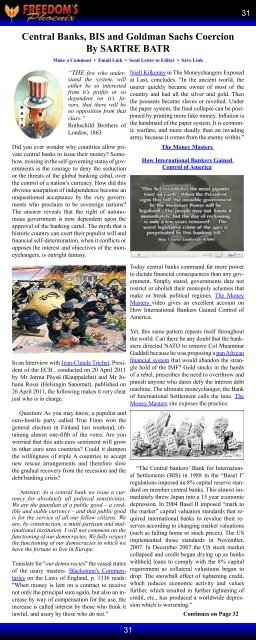October 2011 issue of Freedom's Phoenix magazine - fr33aid
October 2011 issue of Freedom's Phoenix magazine - fr33aid
October 2011 issue of Freedom's Phoenix magazine - fr33aid
You also want an ePaper? Increase the reach of your titles
YUMPU automatically turns print PDFs into web optimized ePapers that Google loves.
Central Banks, BIS and Goldman Sachs Coercion<br />
By SARTRE BATR<br />
Make a Comment • Email Link • Send Letter to Editor • Save Link<br />
“THE few who understand<br />
the system, will<br />
either be so interested<br />
from it’s pr<strong>of</strong>its or so<br />
dependent on it’s favors,<br />
that there will be<br />
no opposition from that<br />
class.”<br />
Rothschild Brothers <strong>of</strong><br />
London, 1863<br />
Did you ever wonder why countries allow private<br />
central banks to <strong>issue</strong> their money? Somehow,<br />
missing in the self-governing status <strong>of</strong> governments<br />
is the courage to deny the seduction<br />
or the threats <strong>of</strong> the global banking cabal, over<br />
the control <strong>of</strong> a nation’s currency. How did this<br />
obvious usurpation <strong>of</strong> independence become an<br />
unquestioned acceptance by the very governments<br />
who proclaim to be sovereign nations?<br />
The answer reveals that the right <strong>of</strong> autonomous<br />
government is now dependent upon the<br />
approval <strong>of</strong> the banking cartel. The myth that a<br />
historic country can exert their populist will and<br />
financial self-determination, when it conflicts or<br />
opposes the interest and objectives <strong>of</strong> the moneychangers,<br />
is outright fantasy.<br />
In an Interview with Jean-Claude Trichet, President<br />
<strong>of</strong> the ECB , conducted on 20 April <strong>2011</strong><br />
by Mr Jorma Pöysä (Kauppalehti) and Mr Juhana<br />
Rossi (Helsingin Sanomat), published on<br />
26 April <strong>2011</strong>, the following makes it very clear<br />
just who is in charge.<br />
Question: As you may know, a populist and<br />
euro-hostile party called True Finns won the<br />
general election in Finland last weekend, obtaining<br />
almost one-fifth <strong>of</strong> the votes. Are you<br />
worried that this anti-euro sentiment will grow<br />
in other euro area countries? Could it dampen<br />
the willingness <strong>of</strong> triple A countries to accept<br />
new rescue arrangements and therefore slow<br />
the gradual recovery from the recession and the<br />
debt/banking crisis?<br />
Answer: As a central bank we <strong>issue</strong> a currency<br />
for absolutely all political sensitivities.<br />
We are the guardian <strong>of</strong> a public good – a credible<br />
and stable currency – and that public good<br />
is for the service <strong>of</strong> all our fellow citizens. We<br />
are, by construction, a multi-partisan and multinational<br />
institution. I will not comment on the<br />
functioning <strong>of</strong> our democracies. We fully respect<br />
the functioning <strong>of</strong> our democracies in which we<br />
have the fortune to live in Europe.<br />
Translate for "our democracies" the vassal states<br />
<strong>of</strong> the usury masters. Blackstone's Commentaries<br />
on the Laws <strong>of</strong> England, p. 1336 reads:<br />
"When money is lent on a contract to receive<br />
not only the principal sum again, but also an increase<br />
by way <strong>of</strong> compensation for the use, the<br />
increase is called interest by those who think it<br />
lawful, and usury by those who do not."<br />
31<br />
Niall Kilkenny in The Moneychangers Exposed<br />
at Last, concludes. "In the ancient world, the<br />
usurer quickly became owner <strong>of</strong> most <strong>of</strong> the<br />
country and had all the silver and gold. Then<br />
the peasants became slaves or revolted. Under<br />
the paper system, the final collapse can be postponed<br />
by printing more fake money. Inflation is<br />
the handmaid <strong>of</strong> the paper system. It is economic<br />
warfare, and more deadly than an invading<br />
army, because it comes from the enemy within."<br />
The Money Masters<br />
How International Bankers Gained<br />
Control <strong>of</strong> America<br />
Today central banks command far more power<br />
to dictate financial consequences than any government.<br />
Simply stated, governments dare not<br />
restrict or abolish their monopoly schemes that<br />
make or break political regimes. The Money<br />
Masters video gives an excellent account on<br />
How International Bankers Gained Control <strong>of</strong><br />
America.<br />
Yet, this same pattern repeats itself throughout<br />
the world. Can there be any doubt that the banksters<br />
directed NATO to remove Col Muammar<br />
Gaddafi because he was proposing a pan African<br />
financial system that would abandon the strangle<br />
hold <strong>of</strong> the IMF? Gold stocks in the hands<br />
<strong>of</strong> a rebel, prescribes the need to overthrow and<br />
punish anyone who dares defy the interest debt<br />
machine. The ultimate moneychanger, the Bank<br />
<strong>of</strong> International Settlement calls the tune. The<br />
Money Masters site exposes the practice.<br />
“The Central bankers’ Bank for International<br />
Settlements (BIS) in 1988 in the “Basel I”<br />
regulations imposed an 8% capital reserve standard<br />
on member central banks. This almost immediately<br />
threw Japan into a 15 year economic<br />
depression. In 2004 Basel II imposed “mark to<br />
the market” capital valuation standards that required<br />
international banks to revalue their reserves<br />
according to changing market valuations<br />
(such as falling home or stock prices). The US<br />
implemented those standards in November,<br />
2007. In December 2007 the US stock market<br />
collapsed and credit began drying up as banks<br />
withheld loans to comply with the 8% capital<br />
requirement as collateral valuations began to<br />
drop. The snowball effect <strong>of</strong> tightening credit,<br />
which reduces economic activity and values<br />
further, which resulted in further tightening <strong>of</strong><br />
credit, etc., has produced a worldwide depression<br />
which is worsening.”<br />
Continues on Page 32<br />
31


